Few Doctor Who stories are famous for their directors, but in the case of Graeme Harper he made such an impact on the show that his work is still being analysed to this day.
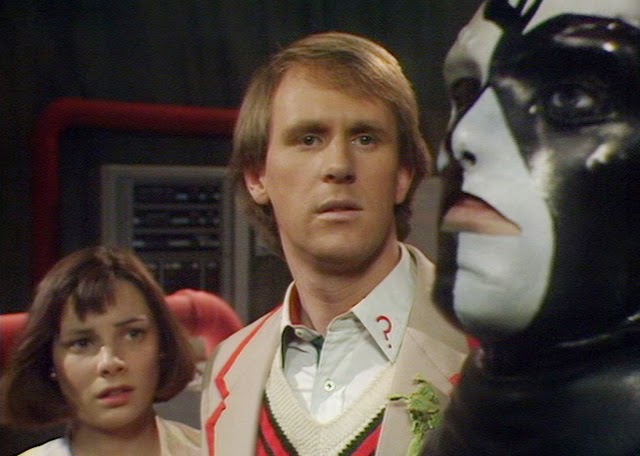
When Classic Who was being produced in the 70s and 80s, directors often had to work within a strict set of guidelines. Television drama was usually limited to a studio-bound, multi-camera setup, made up of large cumbersome cameras which couldn’t be moved easily. Film work was possible as well (although there was normally a limited allocation per drama) and directors infrequently had to deliver the required results incredibly quickly.
This was the world of TV production that Graeme Harper was inhabiting. Often, the biggest priority was just to capture all of the required material before the time ran out. And this meant a literal race against the clock; directors such as Graeme Harper could find their studios plunged into darkness if they continued work beyond 10pm, as the BBC would literally turn the lights off the second the hour rolled around.
This meant that directorial creativity often had to go on the back burner. Innovative directors like Paul Joyce (who worked on the Fourth Doctor story ‘Warriors’ Gate’) invested time in ‘constructing the perfect shot’ and even incorporated handheld camera work into their productions. The problem was, the way of working at the BBC in this time period very often didn’t allow for work to be carried out in this way, and indeed Paul Joyce was fired during his work on ‘Warriors’ Gate,’ one of the reasons being that he was falling dangerously behind.
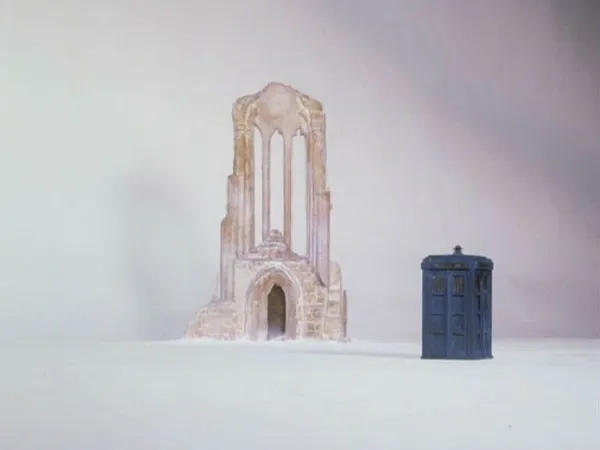
(C) BBC
It is staggering, then, that Graeme Harper managed to incorporate such inventive directorial choices into his work. Although he worked as a production assistant on a number of stories (including ‘Warriors’ Gate’) his main Doctor Who pieces were ‘The Caves of Androzani’ and ‘Revelation of the Daleks’ – two adventures which are now widely regarded as classics.
Of course, the scripts had an essential part to play, but these adventures would arguably not have been so impactful had it not been for Graeme Harper’s direction. He frequently made choices that snapped the action out of the ordinary – choices that weren’t necessarily present in the script, and that other directors might not have considered.
Perhaps the most striking of these can be seen in ‘The Caves of Androzani.’ Over the course of the adventure, viewers had come to know the supporting cast of Salateen and his men, who were among the protagonists of the adventure and were an important part of the overall plot. These characters are gunned down in episode four, but not in a lingering, heroic manner as one might expect; it’s a throwaway moment which is over in the blink of an eye, almost as if the characters were mere extras.
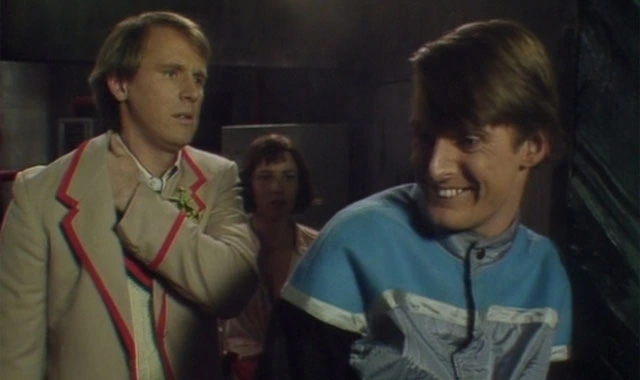
(C) BBC
It’s a brutal directorial choice on Graeme Harper’s part which (intentionally or not) makes a bold statement about the brutality of war, and how the lives of real, significant people can be ended in the briefest of moments.
As such, there is a gritty realism to Graeme Harper’s direction, an effect which is further emphasised by his use of the handheld camera. As mentioned previously, these devices were difficult to source at the BBC, and were not the easiest to use (for one thing, they were exceptionally large.) But they had the manoeuvrability that the traditional cameras lacked, and created the illusion that the scenes were being viewed from a first person observer, like a documentary maker capturing the unfolding action.
And whilst Graeme Harper certainly used the handheld camera to good effect in ‘The Caves of Androzani,’ perhaps the most memorable moment is in the 1985 story ‘Revelation of the Daleks’ when the character of Tasambeker stabs her boss Mr Jobel with a syringe. The camera follows the action as she races across the funeral home, screaming at Jobel that the Great Healer has ordered him dead before plunging a needle into his chest. It’s a haunting, frighteningly believable moment which stretches the limit as to what’s acceptable in a family-oriented show.
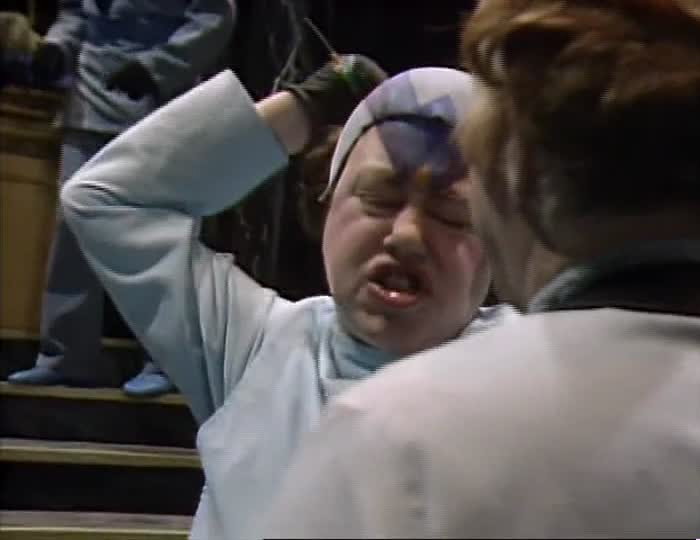
(C) BBC
Certainly, Graeme Harper’s direction never over-stepped these boundaries, but as a director he always seemed keen to capture a story’s realism. For example, elsewhere in ‘Revelation of the Daleks’ the Great Healer (alias Davros) has his hand blown off in an assassination attempt – a moment which was filmed as a full close-up on Davros’ hand, leaving the viewer in no doubt as to what has happened. Yes it was graphic, but not gratuitously so; it was grounded in reality, and invoked the necessary feelings of shock that were appropriate for the situation.
Indeed, one could argue that close-ups were very much Graeme Harper’s forte and were often used to great effect. Again, these choices went against the grain of the more traditional approach at the BBC, which often encouraged directors to capture the action ‘in the wide’ and occasionally punch in for close-ups on certain characters as they were speaking, continually mixing between the two setups.
Graeme Harper’s close-ups, on the other hand, were more carefully constructed, and were often used to introduce characters. For example, in ‘The Caves of Androzani,’ Graeme Harper reveals the villainous Morgus by having him turn to face the camera with an expression of firm indignance, his face filling the screen. And then later, the masked Sharaz Jek is afforded a full close-up in his debut scene as he bursts into maniacal laughter and glares down the lens.
The effect, of course, is that these close-ups capture the intensity of emotion that might otherwise be lost in wider shots. And the word ‘intense’ is perhaps an appropriate one to describe a typical Graeme Harper story; ‘The Caves of Androzani’ and ‘Revelation of the Daleks’ are not exactly light-hearted romps.
It is no wonder, then, that Graeme Harper was the only Classic series director to be recruited when Doctor Who burst back onto our screens in 2005. He was called upon to oversee the return of the famous metal giants in 2006’s ‘Rise of the Cybermen’ and ‘The Age of Steel,’ plus of course the epic Series 2 finale, amongst others.
Which is your favourite Graeme Harper story? And what do you enjoy most about his directing? Let me know in the comments below.




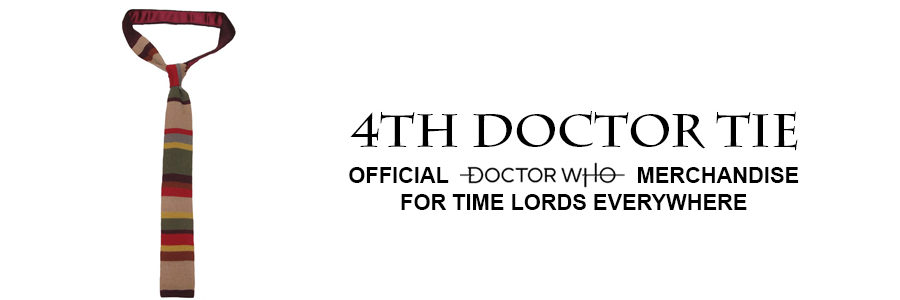



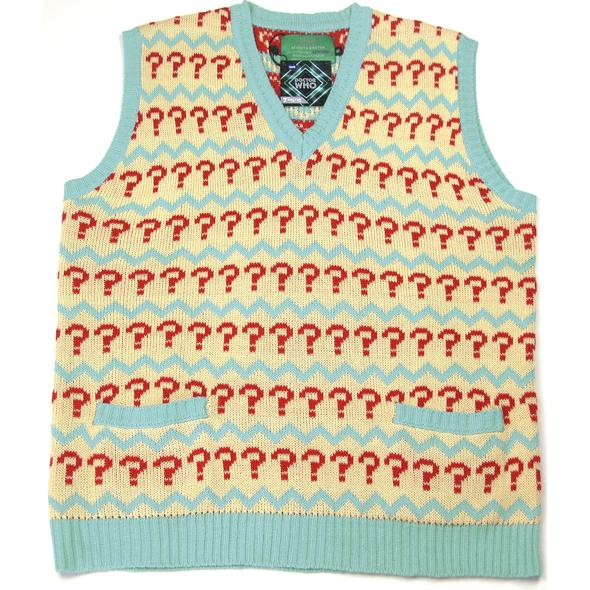
Leave a Reply